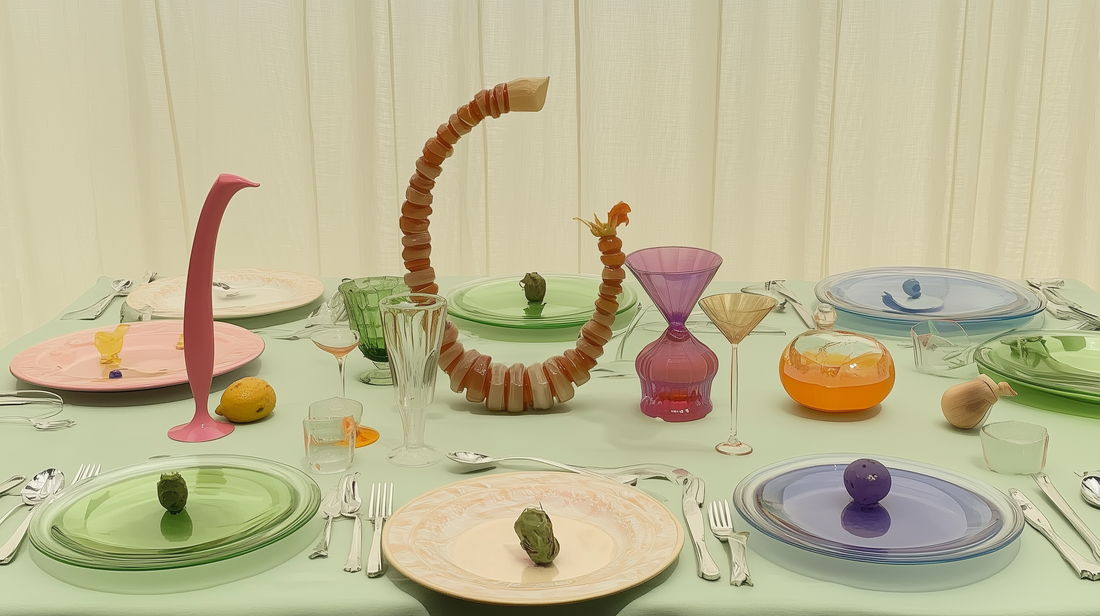Öykü Özal: From Playtime to Plate – How Childhood Memories Inspired My Collaboration with Ornamental by Lameice

For this project, Lameice asked me: "What was your most significant dining experience?"
As I sifted through memories of meals—every restaurant visit, family dinner, and special occasion—I realized something surprising. My most significant dining experience didn’t involve real food at all. Let me explain by sharing a game I used to play as a child whenever we had family friends over.
I’d gather the neighborhood kids, and we’d create an imaginary restaurant with menus filled with our favorite dishes—croquettes, meatballs, anything we enjoyed at the time. After taking “orders” from our parents, we’d rush up to my room to prepare the meals. Of course, the dishes were plates of plastic food toys, but it didn’t matter. The joy came from serving them and feeling the satisfaction of providing, even though the food was
inedible. That simple game gave me a deep sense of affection, connection, and pride in sharing something with the people I loved.
A Childhood Memory Re-imagined

Our experiences and memories shape the way we create. That childhood game, filled with playful imagination and the desire to bring joy to others, sparked the initial flame for my collaboration with Ornamental by Lameice. The way Ornamental celebrates culture and tradition with a playful attitude inspired me. I knew I wanted to bring that same sense of nostalgia and whimsy to the imagery.
Cultural Connections

Both in Palestinian and Turkish cultures, food and sharing a table is a powerful way of showing love and building memories. Whether it’s a large family gathering or a simple drink shared between friends, gathering around a table is about more than just eating— it’s about connection, affection, and tradition. In this way, the table becomes the medium of the designed experience, whether it's casual or carefully organized.
This sense of warmth is what draws us to imagery of food and tableware. Nostalgia and culture are powerful tools in design, evoking deep emotional connections.
The Dinner Party Project

The stark contrast between a very adult act such as hosting a dinner party and a very child-like act such as play is central to this concept. Hosting a dinner party and designing table settings require order and time. To create a visually appealing experience, you must be intentional with what you cook, how you serve, and where you place everything. The experience goes beyond food—it’s about designing the entire gathering. On the other hand, play, while it may have structure, is much more intuitive.
The purpose behind the AI-generated images was to evoke the playfulness of my childhood memory while celebrating the beauty and imperfection of whimsical glassware. The idea was to recreate the feeling of those childhood “meals,” where the food wasn’t real, but the joy and love behind the act of serving were.

I started by imagining how the utensils, plates, and food styling would look. Visualizing a general image—much like a draft—helped me achieve clearer results while experimenting with Midjourney. I based the colors and forms on Ornamental by
Lameice’s glassware, which perfectly captures culture, nostalgia, and whimsy. I wanted the objects to appear a little peculiar and out of place.

After crafting the prompts and establishing a color palette, I began generating visuals. I experimented with different scenes, camera angles, and placements, making note of which images evoked the feelings I wanted to convey.
Translating human emotion into a prompt given to a machine, then seeing it reflected back through the imagery, amazed me throughout the process. I realized that our brains need patterns and symbolism to relate. The food in the images is intentionally off— almost plastic, inedible, a nod to my childhood memory—while the glassware is carefully laid out, elegant and inviting.
Later, I added more playfulness by subtly manipulating parts of the glassware. In one of images, the plate has googly eyes; in others, the intervention is more subtle, like a shape manipulation. These vibrant table settings symbolize more than just a sweet memory—

they embody Ornamental by Lameice’s ethos of blending cultures, embracing imperfection, and finding beauty in the unexpected.
The Power of Storytelling in Design

I believe that design is most powerful when it tells a story. Stories bring value to the things we encounter every day. A product becomes an innovation, an object transforms into a prized possession, and a building evolves into architecture. Through storytelling, design goes beyond functionality, carrying meaning and emotion that enables us to form connections.
This collaboration allowed me to reconnect with my own past while paying tribute to the rich cultural traditions of Palestinian craftsmanship. It reminded me that even the simplest memories can profoundly impact how we see the world and the stories we choose to tell. Working with Ornamental by Lameice has been an honor, and I hope that through these playful, whimsical images, others can feel the love and creativity that went into each design.

2 comments
Heidi
I’m fascinated by this imagery. The colors and reflections into the space is soft yet involved. Can’t look away!
Öykü Özal
It was a pleasure to work on this project. Please let us know what you think!